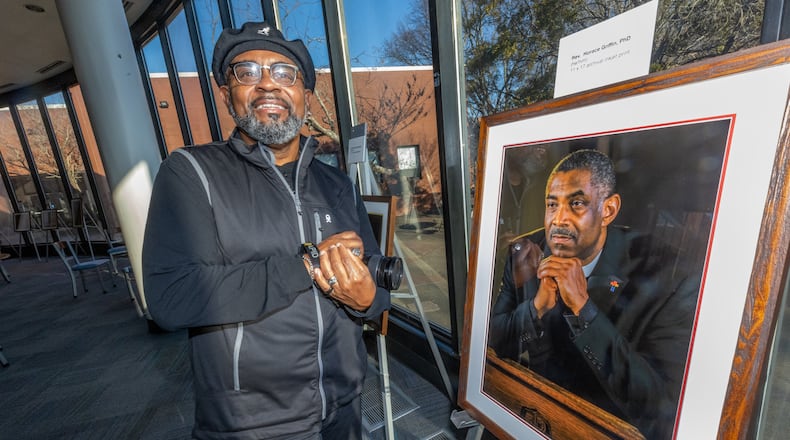The faces in the 13 photographs stare out at you.
Photographer Ralph Basui Watkins doesn’t want you to look away. He purposely shot them to lock eyes with the viewer.
These are his LGBTQ+ “siblings.” People he sees in the classes he teaches at Columbia Theological Seminary or sits next to in the pews at various churches in metro Atlanta. They are his brothers and sisters in Christ but are often held at arms length or outright shunned by many in the Black Church.
“Stand in front of then and look at these folks God made in God’s image,” he said. “Do you believe everybody you lock eyes with is a child of God?”
The exhibit is on display at Spelman College as part of a “The State of the Black Church” symposium on LGBTQ+ and the Black Church, organized by the Chicago-based nonprofit Pride in the Pews, which advocates for inclusive, safe spaces and healing in the faith community.
Credit: Ralph Basui Watkins
Credit: Ralph Basui Watkins
Between 75 and 100 people attended Friday, the first day of the event two-day that runs through Saturday. It included a fireside chat with State Sen. Shevrin Jones and State Rep. Michele Rayner, two openly LGBTQ legislators from Florida; and actor Nicholas L. Ashe, who will screen “The Spirit God Gave Us.”
Ashe, who had a role on “Queen Sugar, television series, will demonstrate how to use storytelling to create more inclusive spaces for Black LGBTQ communities.
This is the first time the organization has held the symposium at an HBCU. Spelman, say organizers, was a good choice because the institution has graduated some of the most powerful women influencers in business, nonprofit and politics, including Marian Wright Edelman founder, Children’s Defense Fund; corporate executive Rosalind G. Brewer; and Stacey Abrams, a political activist and former candidate for Georgia governor.
Credit: Ralph Basui Watkins
Credit: Ralph Basui Watkins
HBCUs have also traditionally been a place to aid the marginalized in society, but even they have not always been welcoming to the gay, lesbian and trans community, but that is changing in some places. .
Last year, Spelman joined many other colleges and universities by holding its first Lavender Graduation Ceremony honoring the contributions and accomplishments of LGBTQIA+ graduates. Seventeen graduates received their lavender stoles, a certificate and received the inaugural bell hooksaward for their courage and tenacity in creating a campus that supports all students and their identities, according to Spelman.
“My wife and I can walk in church holding hands and we’re celebrated,” said Watkins. That might not happen for gay couples.
“That’s one of the blind spots of the Black church,” said Watkins 61, who has designed a series of courses on the theology of radical inclusion.”I argue that from a Black theological perspective, God is a God of the oppressed and that God does his most faithful work in the margins. We consistently see Jesus operating in the margins of society...my LGBTQIA siblings are in the margins.”
Same sex marriage and full inclusion of the LGBTQ community has been a divisive issue among many Georgia houses of worship.
The United Methodist Church, for instance, lost a quarter of its total churches between 2019 and 2023 largely over the issue of LGBTQ inclusion and performance of same sex weddings, according to the Lewis Center for Church Leadership at Wesley Theological Seminary. Most of the disaffiliating churches were the more conservative congregations and in the in the Southeastern Jurisdiction, which includes Georgia,
Over the years, the North Georgia and South Georgia conferences of the UMC, have, together, lost hundreds of churches.
The Rev. Don Abram, founder of Pride in the Pews, said the nonprofit was launched shortly after the protests against the death of George Floyd. He wondered where were people protesting for his community, particularly from the faith community?
“When we are well and healed and whole we can make an impact on our communities,” said Abram, a preacher and activist. He cited also the number of anti-LGBTQ bills either already passed or in the pipeline.
Georgia houses of worship has been among the battlegrounds in the fight of full inclusion of the LGBTQ community and gay rights.
Casey Overton, a member of the Faith Matters Network, attended the gathering. For members of the LGBTQ community the initiative helps recognize and correct the moral injury that has been done to them in church spaces and faith spaces, she said. It also helps them understand that “they matter, they are important and they are loved by God in the fullness of their identity.”
Overton who is a member of the LGBTQ community, grew up in a relatively conservative, evangelical faith tradition. Over time, she said she didn’t feel aligned with her faith and her full self and left church for a while. “I watched the church be cruel to people that I cared deeply about in a lot of ways being cruel to myself as well.”
Credit: Ralph Basui Watkins
Credit: Ralph Basui Watkins
She now regularly attends a church after finding a way and place to practice her faith in an affirming way that is true to who she is and true to the Gospel she loves.
For Watkins, the change starts in grassroots movements and with people in pews who believe all are God’s children.
“You see movement in Pride in the Pews. You see movement in the Fellowship of Affirming Ministries. Here, they are the church...They are the catalyst.”
About the Author
Keep Reading
The Latest
Featured




